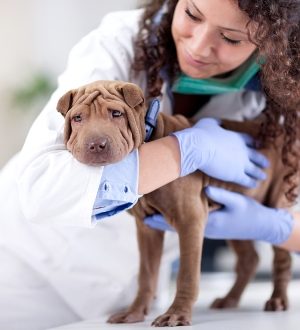- Do you subscribe to Dharma Dog Training’s Newsletter? You should.
- A Unique Campaign from The Humane Society of the United States
- Rabid bats in Omaha- Stay safe, prepared with these tips
- Springtime Activities in Omaha
- Mill Dog Monthly from Bailing Out Benji
- World Spay Day, Legislative Alert in Nebraska
- Attend the Nebraska Rescue Council’s monthly meeting this Saturday
- Five Hard-to-Ignore Reasons to Adopt!
- Paws in Pink to Benefit Breast Cancer Foundation
- VCA, Inc. Acquires MidWest Vet Specialists from Kansas State University
Gut Health Hounds: Optimizing Digestion And Immunity For Dogs With Probiotics

Does your dog have allergies, diarrhea, or skin issues, and you are wondering what can help enhance your furry friend’s gut health and improve immunity?
Probiotics can help your dog if they have frequent gastrointestinal issues like diarrhea or constipation. Using foods or supplements to balance the gut can benefit the digestion process. By normalizing the condition of the digestive system, probiotics help the immune system work properly.
Many dogs tend to respond favorably to probiotic supplements, but you can also go the natural route and give them foods that contain these friendly bacteria, like plain Greek yogurt or certain vegetables. In this article, you will discover how probiotics can help your dog and boost their gut health.
What Are Probiotics?
Cornell College of Veterinary Medicine indicates that “probiotics are beneficial microorganisms that live in your dog’s intestines.” Cornell also explains that there are several conditions for which probiotics may help your dog:
- “Allergies
- Obesity
- Diarrhea
- Coat health
- Skin disorders
- Immune disorders
- Intestinal inflammation
- Irritable bowel syndrome”
More than half of your dog’s immune system is populated in the gut, and part of its job is to protect the body from harmful bacteria. Probiotics encourage good bacteria, which strengthens your canine companion’s immunity.
An unbalanced quantity of “bad bacteria” in the gut can wreak havoc on the immune system, making it more difficult for Fido to combat potential health threats. However, probiotics can help remedy this dilemma and help defend your dog’s body against unwelcome invaders.
What Are Prebiotics?
Prebiotics are beneficial bacteria that can foster the development of exceptional gut health. Fiber is essential for your dog’s digestion and helps to support immune function. The source of prebiotics is found in several nutritional foods:
- Peas
- Apples
- Carrots
- Pumpkin
- Raw oats
- Strawberries
- Blueberries
- Sweet potato
When selecting prebiotic or probiotic foods for your dog, make sure they are safe. For example, dogs can eat broccoli and spinach, but only in small quantities. Prebiotics can be called “food” for probiotics. Prebiotics help the probiotics thrive and vastly increase in number.
What Does It Mean To Find A Safe Probiotic Supplement For Dogs?
If you want to take some of the guesswork out of the best prebiotic foods to feed your dog, instead, look for a supplement that is safe and effective for dogs. Some of the most common probiotic dog supplements are sourced from ingredients like chicory root, soybeans, and Jerusalem artichokes.
Make sure to do your due diligence when researching online for the right probiotic to give your furry friend. You should also talk to your vet before selecting a probiotic. Your trusted veterinarian can help you find the right one for your dog. They can tell you the correct amounts of bacteria your dog should have.
Bioavailability is another factor involved in probiotics. The National Library of Medicine states, “Bioavailability refers to the amount of compounds that completes the route passing through the digestive tract, is absorbed, and reaches the target tissues in the intact or metabolized form to perform its bioactivity or to be stored.” Another probiotic option for dogs is plain Greek yogurt.
What Are Some Of The Triggers For Digestive Issues In Dogs?
Just like humans, dogs have triggers that can cause digestive issues and upset. Giving your pup probiotics can help them adjust, replenish, and balance the bacteria in their gut.
Stress And Anxiety
Dogs experiencing periods of stress and anxiety can affect the balance of microbes in your pup’s gut. For example, puppies who are nervous about going to socialization and good behavior classes may have digestive issues. Stress reduces the number of healthy bacteria, which can endanger the gut and its ability to function correctly.
Antibiotics
Antibiotics unsettle the balance of bacteria in the gut because they not only eliminate harmful bacteria but also destroy good bacteria. This scenario leads to a decline in microbial diversity, which throws the community of bacteria into disarray. If you give your dog probiotics while they are on antibiotics for an infection, it can protect their gut health.
Poor Diet And Nutrition
Dry dog food like kibble is not good for dogs. A diet of straight kibble can be very dehydrating and has been associated with bloat and other health issues. It also contains a great deal of carbohydrates and does not contain enough fiber. Dogs require fiber to help their digestive system function properly. Ultra-processed foods have been linked with inflammatory bowel disease.
Recently, better nutrition has been made available to dogs. Fresh, quality, human-grade food brands like The Farmer’s Dog and Fresh Pet are becoming popular and can assist with optimal health.
Parasites
Parasites can damage the intestinal lining. They cause inflammation, hinder nutrient absorption, and weaken the immune system. Some examples of parasites in dogs include fleas, ticks, and tapeworms. Parasites can also cause diarrhea and vomiting in dogs.
Conclusion
Gut health is vital for dogs because adequate digestion and immune system function help our pets obtain the essential vitamins and nutrients they need to thrive. Probiotics support your furry friend’s overall well-being. A healthy gut also promotes skin and coat health and lowers the risk of obesity. Your dog is part of the family, and making sure they are healthy and strong is a labor of love.
Latest News
-
3 Tips for Pet Owners on Training Rescue Dogs
Owning a rescue dog can take some work compared to...
- Posted 1 week ago
- 0
-
Choosing the Right Pet for Your Lifestyle
Are you thinking about getting a pet but unsure what...
- Posted 3 weeks ago
- 0
-
How to Make Your Rescue Pet as Comfortable as Possible
Did you bring home a new pet from a shelter...
- Posted 2 months ago
- 0
-
How Having A Pet Can Change Your Life
Having a pet can open your heart in ways that...
- Posted 7 months ago
- 0
-
How To Improve The Life Of Your Senior Pet
Do you have an elderly fur baby and want to...
- Posted 7 months ago
- 0
-
Springtime Activities To Enjoy With Your Furry Friends
Are you preparing for warmer weather and want some ideas...
- Posted 8 months ago
- 0
-
Pros And Cons Of Microchipping Your Pets
Have you considered whether your pets should be microchipped and...
- Posted 9 months ago
- 0


















You must be logged in to post a comment Login